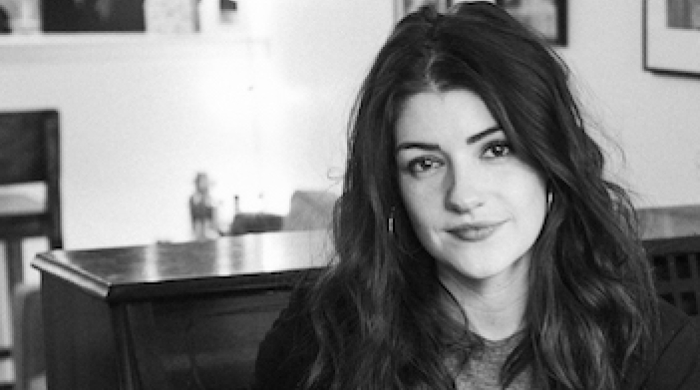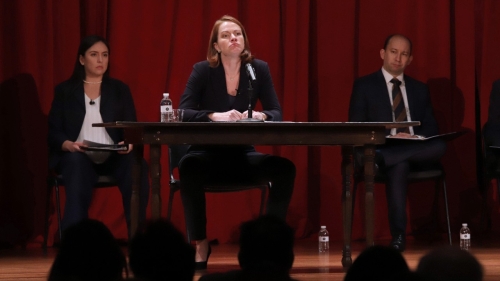
Suzy Hunt portrays Brett Kavanaugh, ©Gallo: Courtesy of NYU Photo Bureau
Over one year ago, on September 27, Christine Blasey Ford and Brett Kavanaugh individually testified before a special convening of the Senate Judiciary Committee. Blasey Ford had accused Kavanaugh of sexually assaulting her when they were teenagers, and some Senate members believed the allegation warranted further investigation. Viewers heard—and perhaps more importantly saw—the different ways in which Blasey Ford and Kavanaugh answered the committee’s questions. Subsequent analyses noted that Blasey Ford appeared “vulnerable,” while Kavanaugh seemed “evasive.” As a result, gender came to occupy a central place in the discussion.
That conversation led Joe Salvatore to wonder: Would audiences feel the same if the central participants' genders were reversed? A clinical associate professor of educational theatre at NYU Steinhardt, he leads the Verbatim Performance Lab, which trains actors in a method of acting that uses media transcripts in order to understand audiences’ biases. VPL emerged following the success of another project that Salvatore co-created called Her Opponent, which inverted the genders of the Clinton-Trump debates and led to surprising results. As he began working on what became The Kavanaugh Files, he employed a similar gender-flipped strategy, but this time—unwittingly—body language took on a far greater importance than it had in past projects.
The Kavanaugh Files reimagines five exchanges from the hearings. In one scene, actor Robert M. Thaxton Stevenson portrays a male Blasey Ford. In another scene, Blasey Ford is played by a woman (Stephanie Anderson), but the role of Rachel Mitchell—the female prosecutor who questioned her—is taken on by a man (Scott Michael Morales).
A Verbatim Performance Lab project shows how body language shapes history.
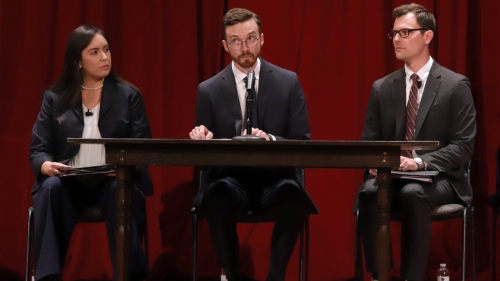
Robert M. Thaxton Stevenson portrays Christine Blasey Ford, ©Gallo: Courtesy of NYU Photo Bureau
Suzy Hunt portrays a female Kavanaugh, and she found his body language almost alien to inhabit. “What I experienced physically was this inner rage,” she said, explaining it was “a physical sensation of privilege” she had not known as a woman. “That privilege, in his mind, comes with certain inalienable rights, like being respected and revered no matter what. ‘How dare you accuse me of this?’ ’The accusation is ludicrous simply because of who I am.’”
VPL actors are what Salvatore calls “ethno-actors” because, like ethnographers, they conduct rigorous investigations into the subjects they portray that incorporate speech, body language, gestures, and even unconscious processes. “They are studying and investigating people down to how they’re breathing,” Salvatore explained. “When we film these investigations, our stage manager Cassie Holzum starts the clock when we start to speak. And when we call cut, she stops the clock, and we match it to the original artifacts.” It’s a scientific approach to art, and one that often leads to unexpected revelations.
Thaxton Stevenson, who plays Blasey Ford, experienced an unexpected shift in how he took up space. It’s almost as though he shrank. “I definitely noticed a difference in the way she delivered her testimony compared to how Kavanaugh did,” he said. “She was very closed off, physically, and—this is a technique thing— it didn’t seem to be that she was breathing with her full capacity. Her breaths were not deep or full.”
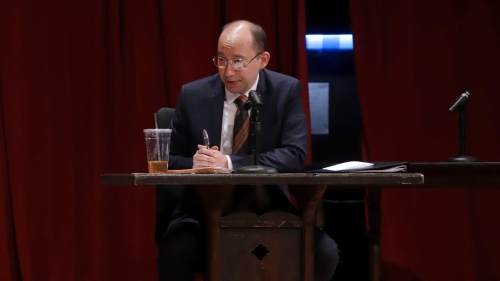
Scott Michael Morales portrays special prosecutor Rachel Mitchell, ©Gallo: Courtesy of NYU Photo Bureau
One of The Kavanaugh Files’ most thought-provoking moments arises with special prosecutor Rachel Mitchell. At the time of the hearings, having a female prosecutor question Blasey Ford seemed strategic, and critics later praised Mitchell for her professional and seemingly empathetic demeanor. But Morales’ gender-flipped performance unveils an element to the questioning that becomes clearer when a man asks the questions. From the amount of space she takes up, to the beverage in a plastic cup she keeps prominently displayed, Morales said, “She’s making herself right at home” in a way that women often don’t feel encouraged to do.
At the most recent staging of The Kavanaugh Files, for NYU’s Constitution Day program, NYU Law Professor Melissa Murray co-facilitated a discussion with Salvatore after the performance. “What [VPL is] doing is really transformative and interesting and so generative,” she said. “They’re forcing people to think more critically about what they’re seeing.”
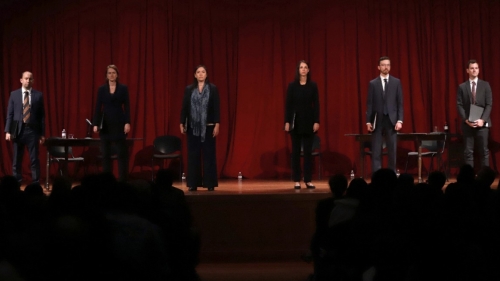
The Kavanaugh Files cast, ©Gallo: Courtesy of NYU Photo Bureau
Performances that challenge audiences to reckon with pre-conceived notions about gender, identity, and credibility come at a crucial time. “I think the project has real repercussions as we go into a presidential election where we have more women and people of color participating than we’ve ever had in the history of our country,” Murray said. “This gave a lot of good food for thought about what identity, in all its forms—physicality, race, gender—means for whether we perceive someone as trustworthy and credible.”
Related Articles
Ed Theatre Alum Receives Prestigious Jonathan Larson Grant
Educational Theatre alumna Emily Kaczmarek works as a playwright, bookwriter, screenwriter, performer, and teacher.


